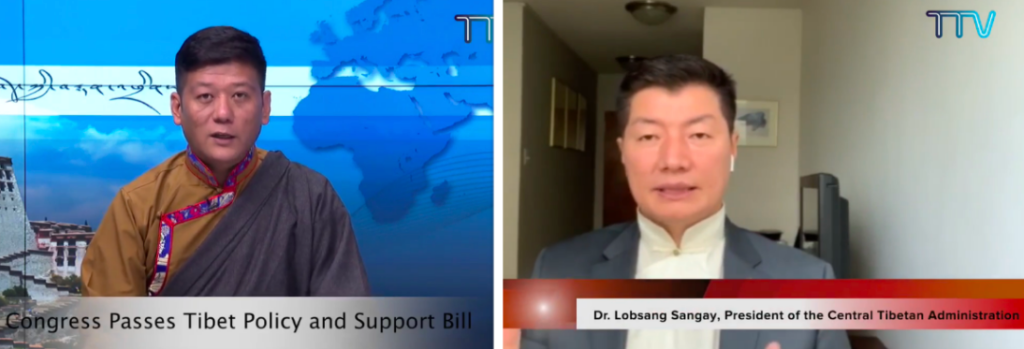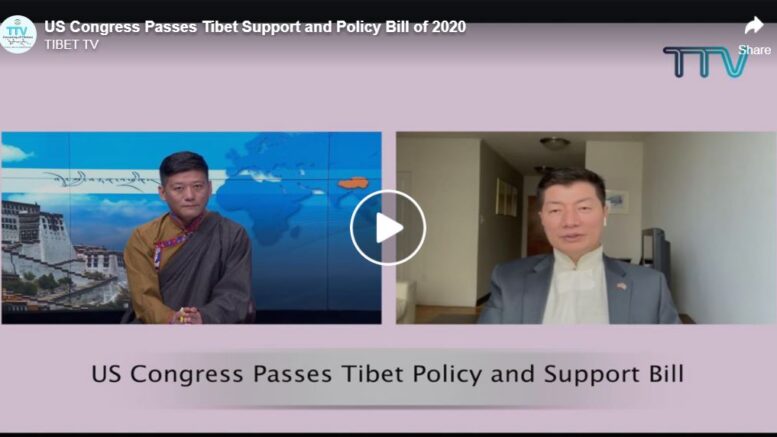Dharamshala: In a landmark victory to the Tibetan people and the Tibetan struggle, the Tibetan Support and Policy Act of 2020 was passed by the US Congress today.
President of Central Tibetan Administration Dr Lobsang Sangay is currently in the US lobbying for the bill. In an exclusive interview with Tibet TV, President Dr Sangay shared some of the important milestones in the passage of Tibetan Support and Policy Act of 2020.
Tibet TV: This is in fact a landmark victory to the Tibetan struggle the fact that today the US Congress passed the Tibet Support and Policy Act of 2020. First of all, tell us the significance of this bill?
President Dr Sangay: This bill is significant, as you have said, it is a landmark bill in the last 20 years that the US Congress is passing a major bill on Tibet. This bill is in solidarity with six million Tibetans who are suffering inside Tibet. Washington DC is saying ‘Tibetan brothers and sisters, we are with you. We are with your freedom struggle. We are for your justice and we will pursue and support your cause’. This is also great tribute to the legacy of His Holiness the Dalai Lama. This is a major boost for the Tibetan freedom struggle. So it is historic.
Tibet TV: Before you left for the US this time, during a press conference in November, you talked about the lobbying efforts that you wanted to undertake in person in order to push this bill into law. The bill was at that time stalled at the Foreign Relations Committee. How did the bill eventually go through and is there any reason in terms of the time it took for the bill to be enacted into law? What lobbying effort you had to undertake in the lead up to the passage of the bill?
President Dr Sangay: It is a long story but I will get to that at an appropriate time down the line. Everybody made efforts. All the Tibetan associations in America including the Tibetan Youth Congress and SFT. All were involved in it. ICT called their members to support the bill.
The House passed with the overwhelming majority but that’s been a long time. When I met Speaker Nancy Pelosi and Representative Jim McGovern, they told me not to worry about the House. So we had to lobby the senate which is ruled by the Republican Party. I made my effort toward the senate and reached out to many Republican senators like Lindsey Graham, Tom cotton, and others. Still, the bill got stuck. There was a glimmer of hope in May. The Senate Foreign Relations Committee’s business meeting was called and Tibet was on the agenda. But then, after a few items, the business meeting was adjourned and nothing happened from May till now. I came to the US in October and made some efforts but the environment in DC was such that it was impossible as it was just before the election. President Trump was infected with coronavirus and Congressmen and Senators were also infected. It was very chaotic and there was no chance. At the end, I asked our friends at the Foreign Relations Committee whether it is worth coming back and trying again; I was told to come back.
I came back in November and the very next day of my arrival, I met separately with the Democratic staff and Republican staff online where we strategized on how should we go about the bill. I was told that the second week of December, the business meeting will be called and Tibet will be on the agenda but, the second week on Friday was when the senate was closing so in a 3-4 days time we had to do 3-4 months of work. From the Senate Foreign Relations Committee, the bill has to pass in the Senate floor before it goes to the House.
The Senate version has amendments including the acknowledgement of CTA as the official representative of Tibetan diaspora all over the world and Sikyong as the President of CTA. That is the major amendment we wanted but then it requires the vote of the House also. It takes a lot of time but to cut it short, finally, we have found a breakthrough. Tibet bill was taken out of all other bills. Obviously, the staff members and the senators all agreed to attach it to the Appropriation Bill. That is how it got passed.
This is a short version of the story because when I left for the US in November so many of my friends were doubtful whether the bill will be passed. Somehow, we managed to get all things done. Thanks to His Holiness the Dalai Lama and thanks to all the monasteries who prayed for the Tibet cause.
Tibet TV: In terms of the content of the new Bill, what are some of the major differences between the Tibet Policy Act of 2002 and this new Bill?
President Dr Sangay: The Tibet Policy Act Bill 2002 and Tibet Support and Policy Bill of 2020 should be taken as one since the latter is the amendment, improvement and addition to the previous bill. The 2002 bill addresses the situation inside Tibet as an occupied Tibet, human rights violations, and appointment of a special coordinator to help proceed the dialogue between the envoys of His Holiness the Dalai Lama and the Chinese representatives. The bill also calls for opening an office in Lhasa and provide funding for Tibetans inside Tibet. In addition to it, the Tibet Support and Policy Bill of 2020 strongly calls for the religious freedom of the Tibetan people, zero interference of the Chinese government in the reincarnation process and if they do interfere, sanctions will be imposed. On the environmental front, Tibet being a water tower of Asia and anyone who invest in Tibet must follow the US guidelines on development etc. The bill specifically says that the US consulate should be allowed to open in Lhasa. If the Chinese government doesn’t allow that, they cannot open any consulate in the US. This is conditional, a very strong one. And one great legacy of His Holiness is the democratic system or democratisation of the exile Tibetan community. The bill also acknowledges that CTA reflects and represents the aspirations of the Tibetans in the diaspora and Sikyong as the President of CTA. For the first time, CTA is legally acknowledged by the US Congress and now through this law, by the US government.
This is a major breakthrough and then there is the funding of no less than 9 million USD to be provided to the Tibetans in India and Nepal, 8 million to the Tibetans inside Tibet and various other funding for Tibetan Scholarship Program. The funding is guaranteed for five years. I am glad that the Tibetan Policy and Support Act is a major political statement for Tibet.
Tibet TV: With regard to the points of the succession of Tibetan Buddhist leaders including the succession of His Holiness the Dalai Lama and also the recognition of Central Tibetan Administration and its leader that is Sikyong as the President as the legitimate representative of the Tibetans in the diaspora in the new bill. What possible impacts do you see this bill will have on China?
President Dr Sangay: If you read the Global Times after my visit to the White House and also the spokesman of the Chinese Foreign Ministry when I visited the State Department, they clearly said so-called Tibetan government-in-exile is a separatist organisation and no one should support it, no one should meet with their officials. This is their stand and now this bill counters that and says, ‘no, what the Chinese government say is not acceptable. The US acknowledges CTA and the Tibetan freedom movement.’ Thereby, sending a message all over the world. The fact that Washington DC is acknowledging the Tibetan movement is a huge political statement, particularly, to the Tibetans inside Tibet.
Yes, this bill will be read and heard all over the world particularly by Beijing and I am glad that six million Tibetans inside Tibet will also get to hear the positive development and support for Tibet.
Tibet TV: As you rightly said the passage of the bill is a huge victory for Tibetans and supporters all around the world. In fact, this will surely send a message of hope and courage particularly to the Tibetans inside Tibet. And the fact that you will be completing your second term as the President of CTA in few months to come, how do you view this achievement now that this bill is becoming a reality?
President Dr Sangay: When I started as the President of CTA in 2011, there was a huge debate going on at the special general body meeting in Dharamshala. I was given the charge of the Central Tibetan Administration. At the end of my term, finally, I managed to have CTA legally and formally recognised by the US Congress and the US government. That means I have fulfilled quite a difficult political task. I am glad that the next Sikyong will have an easier path in the sense CTA is legally acknowledged and funding is provided. Now he/she can focus more on political activities. He/she can double the funding or alleviate the legal recognition of CTA by other governments around the world. A lot can be done. I feel that politically I have fulfilled my task.
Having said that, I am grateful to the leadership of His Holiness the Dalai Lama and the support extended by the Tibetans all over the world. The bill would not have been completed without the blessing of His Holiness the Dalai Lama, Tibetans all over the world particularly Tibetans in America. When I left for the US in November, I appealed to them to write to the Senators and they did. The Tibetans in NY&NJ had to make calls to a couple of Senators. Even from Washington DC as the bill was getting introduced I was told by Speaker Nancy Pelosi and Congressman Jim McGovern not to worry about the passage of the bill in the House. Instead, I was asked to put my effort into lobbying the Senate. I took their advice and guidance and met with a few prominent Senators. They all extended their support.
I am very grateful to Speaker Nancy Pelosi who has been a rock-solid supporter of Tibet and good friend of His Holiness the Dalai Lama. I also want to acknowledge the majority leaders of the Senate, Senator Mitchell McConnell who agreed to push the bill and Senator Chuck Schumer. I also want to thank Congressman McGovern and Co-Sponsor Chris Smith, Senator Marco Rubio and Co-Sponsor Ben Cardin. All of them did a fantastic job. And also the Senate to the Foreign Relations Committee including Senator James Risch and Bob Menendez who I am grateful to.
Among all the Congress members, the staff members were key so I want to acknowledge Jennifer White and Brian Burack from the House of Foreign Relations Committee, Bethany Paulis from Senator Rubio’s office, Michael Schiffer of the Senate Foreign Relations Committee who was with me all the way through; Charlotte Oldham-Moore; Lara Crouch from the Senate Republican side; and Chris Socha. They did all the hard work. Especially, Jonathan Stiffler who was key in drafting the bill from the beginning. All the staff members played very important role. I want to thank all the staff for their tremendous hard work and support, especially to Michael.

President Dr Lobsang Sangay’s exclusive interview with TibetTV.

